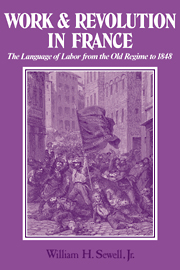Book contents
- Frontmatter
- Contents
- Preface
- 1 INTRODUCTION: SOCIAL HISTORY AND THE LANGUAGE OF LABOR
- 2 MECHANICAL ARTS AND THE CORPORATE IDIOM
- 3 JOURNEYMEN'S BROTHERHOODS
- 4 THE ABOLITION OF PRIVILEGE
- 5 FROM GENS DE MÉTIER TO SANS-CULOTTES
- 6 A REVOLUTION IN PROPERTY
- 7 INDUSTRIAL SOCIETY
- 8 WORKERS' CORPORATIONS
- 9 THE JULY REVOLUTION AND THE EMERGENCE OF CLASS CONSCIOUSNESS
- 10 THE PARADOXES OF LABOR
- 11 THE REVOLUTION OF 1848
- 12 CONCLUSION: THE DIALECTIC OF REVOLUTION
- Notes
- Bibliography
- Index
12 - CONCLUSION: THE DIALECTIC OF REVOLUTION
Published online by Cambridge University Press: 06 November 2009
- Frontmatter
- Contents
- Preface
- 1 INTRODUCTION: SOCIAL HISTORY AND THE LANGUAGE OF LABOR
- 2 MECHANICAL ARTS AND THE CORPORATE IDIOM
- 3 JOURNEYMEN'S BROTHERHOODS
- 4 THE ABOLITION OF PRIVILEGE
- 5 FROM GENS DE MÉTIER TO SANS-CULOTTES
- 6 A REVOLUTION IN PROPERTY
- 7 INDUSTRIAL SOCIETY
- 8 WORKERS' CORPORATIONS
- 9 THE JULY REVOLUTION AND THE EMERGENCE OF CLASS CONSCIOUSNESS
- 10 THE PARADOXES OF LABOR
- 11 THE REVOLUTION OF 1848
- 12 CONCLUSION: THE DIALECTIC OF REVOLUTION
- Notes
- Bibliography
- Index
Summary
LET US POSE two final questions. Was there an underlying logic by which socialism and class consciousness developed? And what was the form of the class conflict and class consciousness that had emerged in France by 1848?
A DIALECTICAL LOGIC
The socialist vision of labor as the constituent activity of the social and political order can be seen as a logical development of certain fundamental Enlightenment concepts, concepts that are summed up in Diderot's vision of man as a sentient natural being who brings greater order and utility into the world by combining or transforming the substances available to him in nature. This vision, one could argue, was subsequently applied to political life by the Abbe Sieves, who made the performance of useful labor a criterion of membership in the polity and redefined the nation as an association of productive citizens living under a common body of laws. The French revolutionaries also wrote it into their constitutions when they established ownership of property, which they saw as the legitimate fruit of labor, as a requirement for the full exercise of citizenship. Socialism, from this point of view, was a logical extension of what the French Revolution had already established; rather than representing human labor indirectly, through property, socialism insisted on direct representation of labor itself.
This account of socialism as a development of Enlightenment ideas contains an important element of truth, but it also conceals far more than it reveals.
- Type
- Chapter
- Information
- Work and Revolution in FranceThe Language of Labor from the Old Regime to 1848, pp. 277 - 284Publisher: Cambridge University PressPrint publication year: 1980

